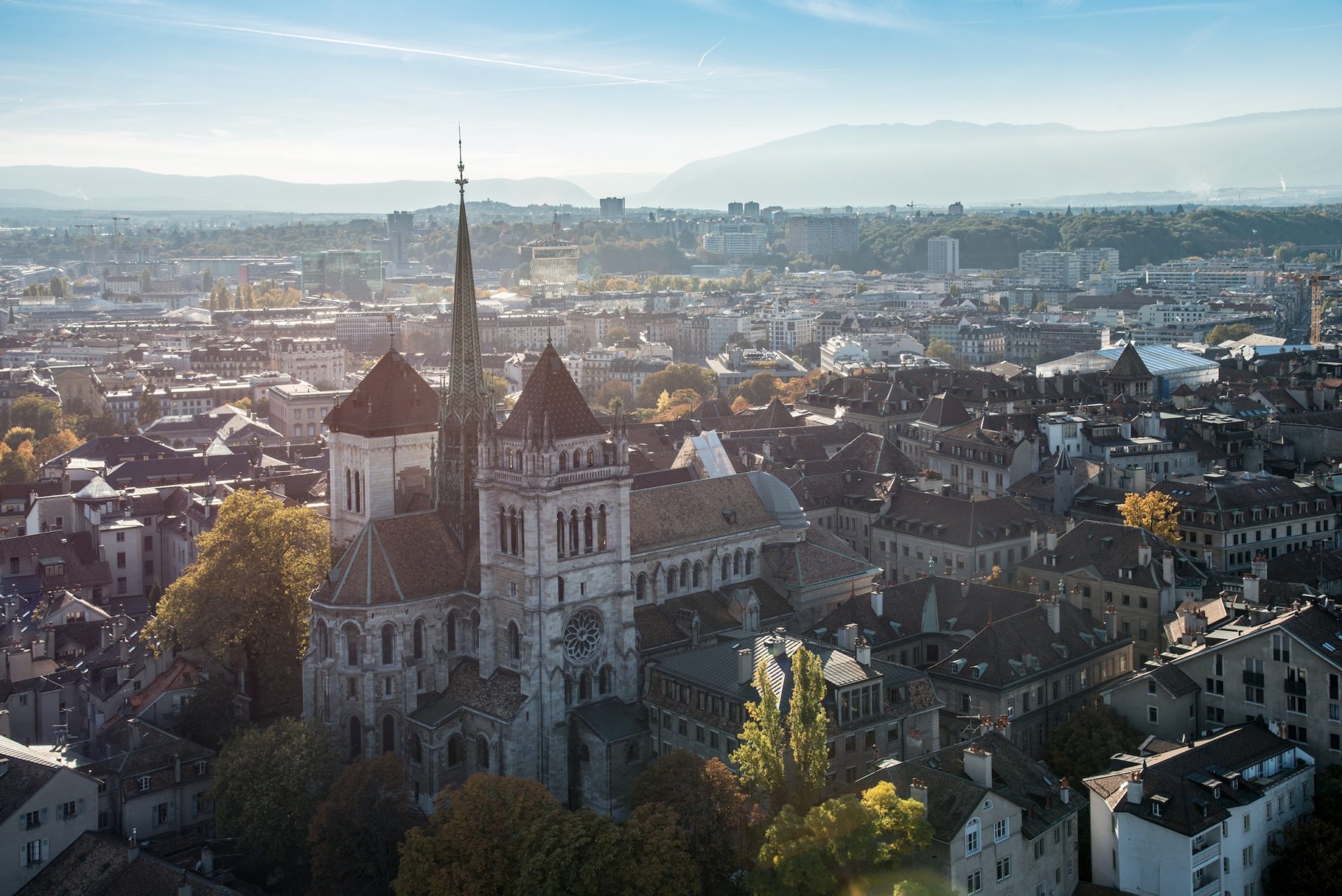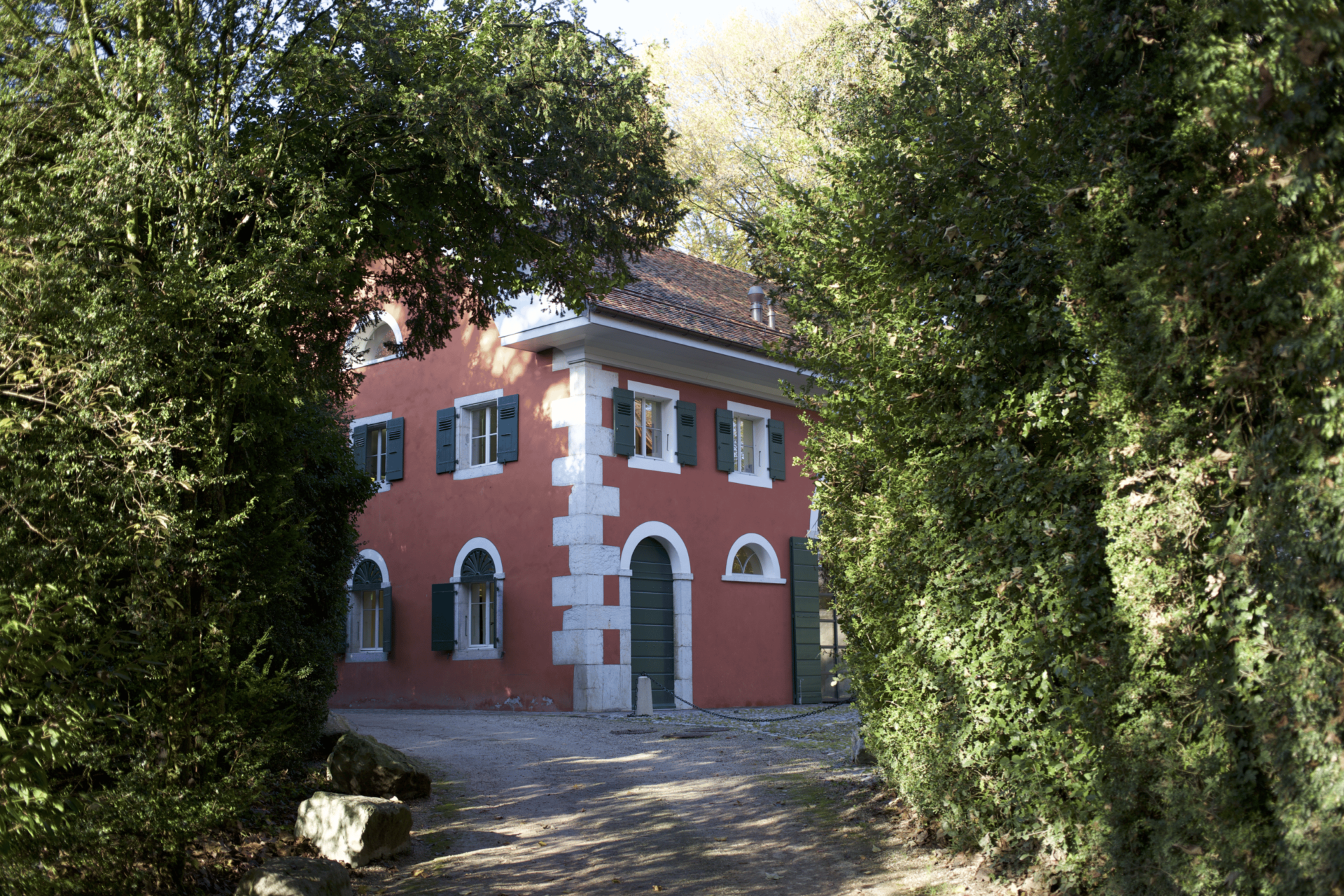

The history of the Foundation
Almost 50 years at the service of International Geneva
The Fondation pour Genève was created in 1976 by a group of Geneva personalities wishing to contribute to the reputation of Geneva in Switzerland and in the world. The first edition of the Foundation’s Prize was organized in 1978. Subsequently, the Foundation developed a whole series of initiatives aimed at facilitating the reception of internationals, with the desire still intact today to strengthen the links between international Geneva and local Geneva.
History
The Fondation pour Genève was created in 1976 by Marcel A. Naville, Jean-Flavien Lalive, Robert Vieux, Pierre Siclounoff and Jean Babel. Their goal: to promote the influence of Geneva in Switzerland and abroad. Marcel A. Naville, a banker and former President of the ICRC, took over as President.
The Director General of the United Nations Office in Geneva, Vittorio Winspeare-Giucciardi, was awarded the first Fondation pour Genève Prize in 1978.
In 1986, the Fondation pour Genève inherited the fortune of Georges Junod, a citizen of Vaud residing in Geneva. The Georges Junod Fund, which helps elderly people in need, was created at the request of the deceased.
In 1998, the Fondation pour Genève merged with the Fondation Un Avenir pour Genève and appointed Ivan Pictet as President. Un Avenir pour Genève had been created in 1994 by Yves Oltramare and Ivan Pictet. The aim of this Foundation, chaired by Arthur Dunkel, former Director General of GATT, was to develop a strategic vision for international Geneva in a concerted manner. It has greatly contributed to giving life to the public-private partnership in favor of international Geneva. One of its most important initiatives was the launch of "Geneva Tomorrow", an initiative to raise awareness of International Geneva among all the sectors of activity concerned with hosting.
Under the presidency of Ivan Pictet, the Fondation pour Genève is pursuing the "Genève Demain" awareness-raising process, the highlight of which is the organization of the symposium "Let's build the Geneva of Tomorrow" at the Palais des Nations. 200 people took part and agreed on a series of actions to be implemented from 1999 onwards to develop the framework conditions of international Geneva. The secretariat of the Fondation pour Genève was then directed by Tatjana Darani.
Among the highlights of her first years as President, the Fondation pour Genève co-organized with the United Nations Office in Geneva an open weekend at the Palais des Nations, as well as the "Geneva 2000" evening, on the occasion of the UN Special General Assembly on Economic and Social Development.
In 1999, Daisy Pictet and Christiane Steck created the Cercle Genevois-Conjoints de Diplomates, which later became the Cercle International de la Fondation pour Genève
Ivan Pictet handed over the presidency of the Fondation pour Genève to Guillaume Pictet in 2002. The Foundation participates in the awareness campaign in favor of Swiss membership in the UN.
In the 2000s, the Fondation pour Genève became associated with international organizations and co-organized several anniversaries and open days.
- 2004: Participation in the 50th anniversary of CERN.
- 2005: Partnership with the United Nations Office in Geneva around the 60th anniversary of the United Nations.
- 2009 : Participation in the awareness campaign in favor of the World Trade Organization (WTO) and the extension of its building.
In 2006, the Fondation pour Genève participated in the launch by Mandat International and the Department of Public Education of the "Eduki" program on international Geneva for students in the orientation cycle and secondary schools.
In 2007, the Fondation pour Genève publishes and distributes the first Cahier de l'Observatoire, "Soft Gouvernance", dedicated to paradigm shifts in global governance.
In 2008, the Fondation pour Genève took the Diplomatic Club of Geneva under its aegis and participated in its renewal, alongside the federal and Geneva authorities.
In 2009, Guillaume Pictet handed over the presidency to Ivan Pictet.
The Fondation pour Genève continues to support the Open Days of international organizations, the United Nations (2014 and 2017) and the International Labor Office (2019).
In 2013, the Observatory of the Fondation pour Genève launched a series of studies on the impact of international Geneva on the Lake Geneva region and, as of 2019, a series devoted to the poles of excellence of international Geneva.
On the occasion of the bicentenary of Geneva's entry into the Swiss Confederation in 2015, the Fondation pour Genève organized the "Geneva meets the Swiss" tour to present the work of the international organizations based in Geneva to the Swiss population. Geneva presented itself, for one day, in 43 Swiss cities as well as in Vaduz in Liechtenstein.
The Foundation is also committed to raising awareness of the 17 Sustainable Development Goals (SDGs), established in 2015 by the United Nations, through a traveling exhibition.
Ivan Pictet left the Fondation pour Genève in 2020 after having led it for nearly 20 years. Marc Pictet succeeds him.
In 2023, Fabrice Eggly took over as Director of the Fondation pour Genève. A strategic reorientation took place, with the Foundation's approach centred on three main missions: to promote Geneva's reputation, its attractiveness and its openness to the world. Collaboration with the authorities and public and private partnerships have been strengthened, in particular through a vast project on the impact of international Geneva. An academic study has been produced by academic partners, with the support of the public and private sectors, and a series of programmes on Léman Bleu has been launched to raise public awareness of International Geneva in all its diversity.
History of the FPG Network
In 1999, Daisy Pictet and Christiane Steck created the Cercle Genevois-Conjoints de Diplomates. 60 Genevan women were mobilized to welcome the spouses of diplomats.
Françoise Demole and Pierrette Waldvogel launched the "Multi.Rencontres" group in 2003, aimed at the wives of the directors of multinational companies. In 2007, the group had about 100 participants from the international private sector.
In 2008, the Cercle Genevois-Conjoints de Diplomates merged with the "Multi.Rencontres" group and took the name "Cercle des Conjoints". It is aimed at spouses of diplomats and CEOs of multinational companies.
Florence Notter-Daugny takes over the presidency of the Cercle des Conjoints in 2010. New members succeed the founders to animate the different activity groups.
The Cercle des Conjoints changes its name in 2012 and becomes the "Cercle International de la Fondation pour Genève". Its aim is to facilitate the integration of internationals into the life of Geneva and is intended for professionally active women. In 2021, the Circle will also be open to men and will propose new activities.
The Club Diplomatique de Genève was created in 1976 on the initiative of young diplomats wishing to establish links with international personalities visiting Geneva.
In 2008, the Fondation pour Genève gave a new start to the Diplomatic Club, with the patronage of the Federal and Geneva authorities and the United Nations Office in Geneva. It moved to La Pastorale and its Secretariat was provided by the Fondation pour Genève. The former State Councillor Carlo Lamprecht was elected President. A first event is organized at CERN, followed two months later by a dinner with the UN Secretary General Ban Ki-Moon.
Former Swiss Ambassador Raymond Loretan succeeds Ambassador Luzius Wasescha as President in 2016. The Club becomes operationally autonomous with its own secretariat, now headed by its committee.
In 1999, Diane Zoelly set up a group of volunteers called the "Welcome Network" to develop various activities to improve the integration of newcomers to international Geneva. The Welcome Line and the Language Exchange were launched by the volunteer members of the Fondation pour Genève.
The first Escalade festival for internationals was organized in 2003 on La Pastorale estate.
In 2007, the Welcome Network was transferred to the CAGI, which now coordinates it with the support of 30 volunteers from the Fondation pour Genève.
In 2020, Diane Zoelly handed over the presidency of the Welcome Network to Juliette van Berchem.
In 2006, the Fondation pour Genève participated in the launch by Mandat International and the Department of Public Education of the "Eduki" program on international Geneva for students of the Cycle d'orientation and secondary schools.
From 2014, the Foundation supports the development of the Eduki Foundation. The presidency is entrusted to Martine Brunschwig Graf, former National Councillor.
In 2022, Martine Brunschwig Graf will hand over the presidency to Francine de Planta.
History of La Pastorale
The Pastorale estate was built between 1831 and 1836 at the request of Eugène de Budé, an officer of the Grand Duke of Baden and descendant of a long line of French aristocrats.
Among his ancestors was the great humanist Guillaume de Budé (1467-1540), the founder of the Collège de France. In 1549, his wife and children took refuge in Geneva for religious reasons. In the 16th century, Geneva became the "Protestant Rome", a city of refuge for the Reformed in Europe.
The de Budé family had owned the land on which the estate was built for many years. Marc François Brolliet (1796-1879) was the architect of the Pastorale estate. He was the first Genevan to study at the Beaux-Arts in Paris. Geneva owes him, among other buildings, the neoclassical Geneva Temple in Carouge (1819-1822), as well as the Maison Brolliet (1834), a neo-Palladian building on Place du Port.
The architecture of the mansion follows the Italian Renaissance style, inspired by certain villas designed by the architect Andrea Palladio. The outbuildings are inspired by Bernese farmhouses.
On his death in 1875, Eugène de Budé bequeathed the estate to his niece Jeanne Sophie de Budé, daughter of Louis Jules Eugène de Budé, who married Adolphe Pasteur.
Jeanne Sophie Julie Pasteur's descendants sold the estate to Dr Alec Cramer in 1927. Member of the ICRC, Head of the Personnel Department of the Central Agency for Prisoners of War, Chairman of the ICRC Medical Commission and Director of the Geneva Red Cross Hygiene Dispensary, his commitment reflects Geneva's humanist tradition. We owe him the name "La Pastorale" for the estate. Before that, it was known as "Morillon".
In 1955, the Cramer family provided La Pastorale with accommodation for Nikita Khrushchev, First Secretary of the Communist Party, his head of government, his Minister of Defence and his Minister of Foreign Affairs, as part of the Geneva Summit attended by four major powers at the time.
In 1957, part of the estate was sold to the State of Geneva with a view to building a Congress Centre, which was never built.
The estate became the property of the State of Geneva in 1995, when it was sold by the Cramer family. It was classified in 1997.
In 1997, after two years of renovation, the mansion became home to the first institutions of international Geneva, the CAGI and the Swiss Press Club. In 2006, the Maison rose was renovated and the Fondation pour Genève moved in the following year.
The State of Geneva then transferred the estate to FIPOI in 2016.
